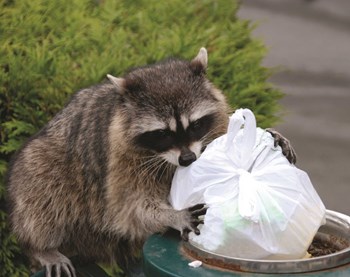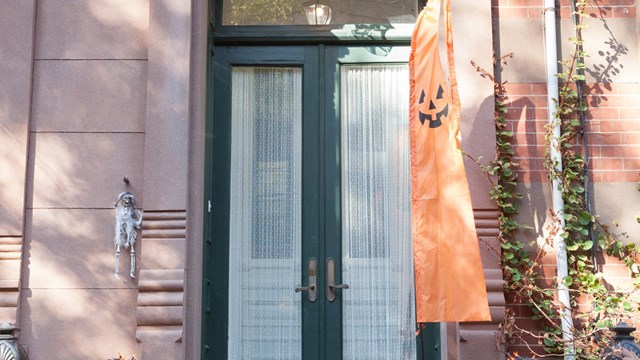
The New Jersey Division of Fish and Wildlife says that there are over 800 species of wildlife living in the Garden State, and while most of them will never been seen on association properties, it seems that others are showing up more than ever before.
On Facebook recently, one resident of Nutley proclaimed “The goose problem in Nutley is ridiculous!” Since the 1980s, the Garden State's black bear population also has been increasing, with confirmed bear sightings in all 21 of New Jersey's counties. In a recent newspaper article, Larry Katz, professor of animal science at Rutgers University, says the white-tailed deer population in some Jersey suburbs exceeds 100 deer per square mile when it should be only 5 to 10 deer per square mile.
Wildlife can cause a tremendous amount of damage as they navigate their way onto properties. Migrating geese can befoul golf courses, deer can chew hedges into mulch, and gophers, raccoons, and squirrels can wreak havoc on landscaping, strew garbage for blocks, and infringe on residents’ peace and quiet. Bats can nest in attics, causing a build up of unsanitary conditions thanks to their droppings, or guano.
Drew Cowley, president/owner of Little Rascals Nuisance Wildlife Removal Services in Neptune City says the most common wildlife complaints he gets are for birds, bats, raccoons and squirrels. “They constantly get in through vents and attic fans and with association’s dumpsters, opportunistic raccoons, chipmunks and rats will try to get in if garbage is not disposed of properly.”
“Gophers can also cause sidewalk damage from burrowing under and landscape damage depending on the foliage around the structures,” says Raymond Navarro, special operations manager of Cooper Pest Solutions in Lawrenceville.
The Humane Society of the United States says that Canadian Geese have also become an increasingly bigger problem to the entire country. Geese are drawn to water, so they’ll be attracted to an association’s retention pond or lake, but the problem that residents have with geese is often aesthetic with their droppings littering sidewalks and grass. In Shamong Township, a swimming spot was closed for a week because of high bacteria contamination from geese droppings.
“Residents and guests walk through those droppings and kids play on the grass and bring the droppings somewhere else, which can’t be good for you,” says Brett Madden, owner of Geese Chasers of North Jersey.
Cowley says that every season brings its own animal problems. “In the spring, raccoons gave birth so they are finding attics and chimneys,” he explains. “In the fall, goslings have grown up and the mom and dad shed their feathers, so they pond hop.”
Squirrels tend to look to build an interior nest in the fall, but they also build multiple nests. “In case a nest blows down when it’s 20 degrees out, otherwise they won’t have enough time to build a nest,” he says. “At this time of the year squirrels are also gearing up for winter. They have their young in February and maybe a second litter in April. Gophers hibernate in the winter, so there are no issues there, but they are more active in the mid to late summer.”
Don’t Feed the Animals
While feeding the ducks, geese, deer and stray animals might sound like fun, “boards, communities and management should not feed animals, because they really are contributing to the problem,” says Madden.
It's actually illegal in New Jersey to feed bears, and it's dangerous. Anyone feeding bears could face a penalty of up to $1,000 for each offense.
And homeowners who leave a garage door open or garbage uncovered are just inviting trouble. It’s an open invitation for furry critters to come in and forage for goodies. “In winter, bears are fattening up for hibernation so they’ll rummage for the most food,” says Cowley. “They are going after fatty products, as opposed to berries in the spring and summer, so they come closer to homes.”
Keeping the garbage covered and inaccessible will help keep the bears away.
Another way to keep animals off of an association’s property is to make landscaping changes. Plant vegetation that deer do not find tasty or tall vegetation near water areas to keep out geese (they think their prey hides in the tall areas). “Trees should also be cut back more than six feet from the structure,” says Navarro. “That limits an animal’s ability to get on the house.”
Catch and Release
Other methods that an association uses will depend on what’s allowed or acceptable in the area and the property’s budget. “Everything is trapped and we either release them, with permission of the landowner, or euthanize the animals and that’s a rule in New Jersey,” says Pete Katula, sales representative of RM Termite and Pest Control in Somerset.
“The state is concerned if the animal is rabid and we trap it and move it we’re spreading the rabies,” says Katula. “Once we’re in and have trapped it, we’re limited to what we can do. The community should be taking steps to make sure the animal is not attracted to the community. Prevention measures are what are going to be the most humane thing for the animals.
Birth control for birds is another available option. “Most people consider that humane because you’re not hurting the animals, but there is always going to be someone who doesn’t like what you’re doing,” says Navarro.
Today, there are several advancements that help evict wildlife from properties, including the use of a GPS system and trail cameras. “There are GPS systems on traps so when the door closes, we get a text message/email, so the animal isn’t sitting out there in the heat or cold,” says Cowley.
Trail cameras are set up to take photos as something goes by. “We’ll use it to figure out what we’re going after,” says Cowley. “Does it need our attention or can I prove to the homeowner it’s nothing serious?”
To move geese off the property, people have tried fake dogs, chemical sprays and water sprinklers. They are not long term solutions, but according to the Humane Society, there are long-term humane solutions such as population stabilization, which slows down or stops the increase in resident goose population. It uses an oiling system that stops the eggs from development. As a result, no goslings mean the parents and other members of the flock have no reason to stay. A border collie is also used.
“The border collie method is effective because it mimics an arctic fox, a natural known predator of the Canadian geese,” says Madden. “With the dog, the geese think it’s not safe for them to be there.”
Madden conducts an initial site inspection and shows the manager a demonstration of what his company does. A company that works with border collies must have special training to work with the dog and, Madden says, a special permit taken out in the name of the owner of the property if there is going to be any handling of the eggs.
The Humane Society states on their website that border collies should not be used between mid-November and mid-May. It's too cold in the winter and nesting geese should not be disturbed.
Whether or not a wildlife company can do anything about any animals depends on the problem. For example, animals inside a building or unit can be trapped, but two geese in a pond that arrive once a week is something that residents will have to live with. Remember that outside is their homeland. However, fifty geese on a property that are chasing residents and littering with their droppings may require an expert.
“The biggest mistake that I see is when someone in the association says ‘I’ll do it.” says Katula. “If you trap an animal it become defensive and it’s instinct is to attack. Leave it to the professionals.”
Cowley was recently called to Pennsylvania where sparrows were getting into the roof rafters of a store. The painter offered to install bird netting, but walked off the job because he couldn’t do it.
“Another roofer was working on a house where bats were inside, so instead of calling us he closed up the hole and all 50 bats died,” says Cowley. “We had to come in, clean out the bats, redo the insulation, sanitize and deodorize. I would’ve opened the hole and given them a chance to get out. Then I’d close off the attic. You wouldn’t ask me to do the roof, don’t ask a roofer to take care of animals.”
For squirrels and gophers Navarro suggests either a trap and release, if you have permission to release them, or trap and euthanize. “We also use a one-way tunnel that shuts behind them. The problem with releasing squirrels is if you take them out of the environment, they have no home and no food and they’ll die an agonizing death. Euthanasia it is more humane. Another problem is if you catch a momma, you can orphan that young animal.”
In New Jersey wildlife experts must tag traps with an ID number and company name. “Homeowners can trap in New Jersey, but when you release it you have to have permission to release it on the property,” says Navarro. “The state doesn’t want animals dropped off in certain areas. They want us to not always go to the same area.”
When hiring a wildlife or pest control expert, make sure they have the right permits or licenses to do the job. “When you get into trapping with snares you need to be licensed with the state and it always helps to be a member of the National Wildlife Control Operators Association,” says Cowley.
The association is organized exclusively as a mutual benefit non-profit trade association to assist persons or organizations providing commercial wildlife damage management and control activities. The association shall be active in training, educating and promoting competence, service and integrity to the members of the wildlife damage management industry.
Wildlife experts can work both on annual contracts or one-time visits. “The price depends on so many variables, including the size of the facility, water sources and more,” says Madden.
If an animal is in a unit, not a common area, the responsibility may be tenant or unit owner’s depending on the rules of the association. “If I’m getting bats out of a particular unit, it’s per unit pricing,” says Cowley. “But if I’m bat-proofing the entire community that’s a different price.”
Being proactive in keeping animals out of the buildings and off the property by securing access, including loose garbage and holes in walls, is the first step to protecting the property from pesky animals.
Lisa Iannucci is a freelance writer and a frequent contributor to The New Jersey Cooperator.






Leave a Comment